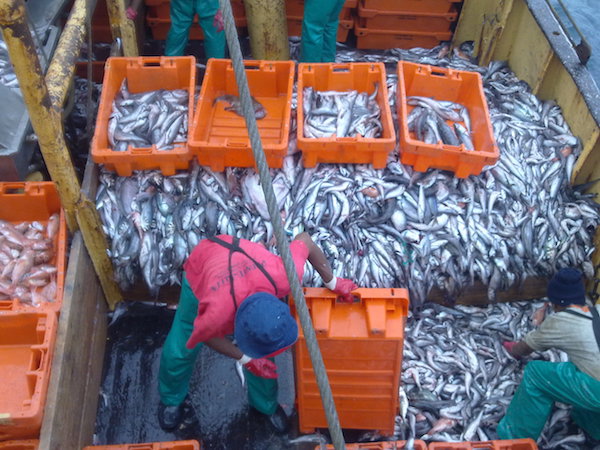SEJournal Online is the digital news magazine of the Society of Environmental Journalists. Learn more about SEJournal Online, including submission, subscription and advertising information.
 |
| A South African fishing trawler. Fleets of large ships ply international waters, catching huge amounts of fish. Photo: Zatoka33 via Wikimedia Commons (CC BY-SA 4.0). |
Issue Backgrounder: WTO Deal on Fishing Subsidies May Reduce Ocean Overfishing
By Joseph A. Davis
An agreement just inked by 164 nations in the World Trade Organization that aims to dampen the most harmful subsidies that encourage global overfishing may make for an environmental reporting bounty in the next few years.
The deal, clinched in Geneva, Switzerland, in the early hours of June 17, was a compromise that left some nations and conservationists unsatisfied. Others viewed it as an accomplishment, given that it had taken more than 20 years to negotiate under the framework of the WTO.
The agreement will not take effect until two-thirds of the WTO members ratify it — by depositing their “instruments of acceptance” with the WTO. The ministers who met in Geneva will meet again in two years, at which time they may be able to develop the agreement further.
Global protein stock overfished
The issues the deal addresses are critically important, since many of the world’s billions of people get their protein from marine fisheries, with fish providing 20% of animal protein needs for 3.3 billion.
Yet the Food and Agriculture Organization, a U.N. body, estimated that 34% of global stocks are currently overfished, compared to 10% in 1974. In all, experts estimate that some 90% of all marine fish stocks are fully exploited or overfished.
Subsidies make things worse in a number of ways, driving unsustainable fishing. A 2018 study showed that without government subsidies, up to 54% of high seas fishing grounds would be unprofitable.
Industrial vs. small-scale fishing
Because there are many kinds of marine fishing, one way to look at the issue is via the contrast between industrial fishing and smaller-scale, artisanal fishing. Through this lens, it can become an environmental justice issue (although that, too, can be an oversimplification.)
Along coasts all over the world — from Goa, India, to Gloucester, Massachusetts — fishers from local villages have traditionally gone out on short trips in small boats, caught fairly small catches, sold them locally or at the dock, and sustained their families and communities. Often they stay within their nation’s exclusive economic zone.
Large ships have plied international waters far from
their home ports, catching huge amounts of fish.
Some use destructive methods like bottom trawling.
By contrast, large ships (fleets, even including processing and refrigeration ships) have plied international waters far from their home ports, catching huge amounts of fish. Some use destructive methods like bottom trawling.
On the high seas, in international waters, the reach of the law is attenuated. What law there is goes through a network of 17 regional fishery management organizations, or RFMOs. But RFMOs do not cover all fisheries and not everyone obeys their rules.
‘Worst offenders’ on subsidies
Governments subsidize marine fisheries in many ways, including by offering below-market pricing for fuel, gear and vessels, as well as building ports and providing various tax breaks.
Estimates vary as to the total amount of government subsidies to fishing operations. Pew Charitable Trusts, a think tank that advocates reform, estimates global total subsidies at the equivalent of $35 billion a year — of which $22 billion are “harmful subsidies” that promote unsustainable fishing.
China is by far the worst offender. Its “harmful subsidies” amount to several times the amount from the next-highest, the European Union. Overall, seven entities account for over two-thirds of the harmful subsidies worldwide, according to Pew: China, Japan, the EU, South Korea, Russia, the United States and Thailand.
What the WTO agreement does
The agreement:
- limits subsidies for illegal, unreported and unregulated fishing;
- limits subsidies for fishing of overfished stocks;
- limits subsidies to vessels fishing on unregulated high seas; and
- includes measures to enhance transparency and accountability.
Governments agreed to continue negotiation over further rules to limit harmful fishing.
Reporting resources
Here are some of the players who may make good sources.
- World Trade Organization: The international body that negotiates trade issues among governments. It has a lot of information about fisheries.
- Pew Charitable Trusts: A think tank that advocates through its “Reducing Harmful Fisheries Subsidies” project. The organization had strongly advocated for the WTO deal and said it was pleased that the agreement had been reached.
- Oceana: A nonprofit advocacy group focused on ocean conservation. The group said the WTO deal “falls short of the target” because too much had been given away to get the final agreement.
- International Institute for Sustainable Development: An independent think tank devoted to sustainability.
- International Coalition of Fisheries Associations: A federation of fishing industry trade groups.
[Editor's Note: For more on ocean issues, see our new special report on ocean-based climate solutions, along with the recording of a related webinar "Oceans of Solutions: Covering 'Blue Climate' and Ocean-Based Climate Strategies." Plus, check out an SEJ News story, "SEJ News: Time To Flip the Ocean Script — From Victim to Solution" and the latest fish and fisheries-related headlines from EJToday.]
Joseph A. Davis is a freelance writer/editor in Washington, D.C. who has been writing about the environment since 1976. He writes SEJournal Online's TipSheet, Reporter's Toolbox and Issue Backgrounder, and curates SEJ's weekday news headlines service EJToday and @EJTodayNews. Davis also directs SEJ's Freedom of Information Project and writes the WatchDog opinion column.
* From the weekly news magazine SEJournal Online, Vol. 7, No. 28. Content from each new issue of SEJournal Online is available to the public via the SEJournal Online main page. Subscribe to the e-newsletter here. And see past issues of the SEJournal archived here.

















